Oakland's Akintunde Ahmad is now a clothing designer, investing in his community and West Africa
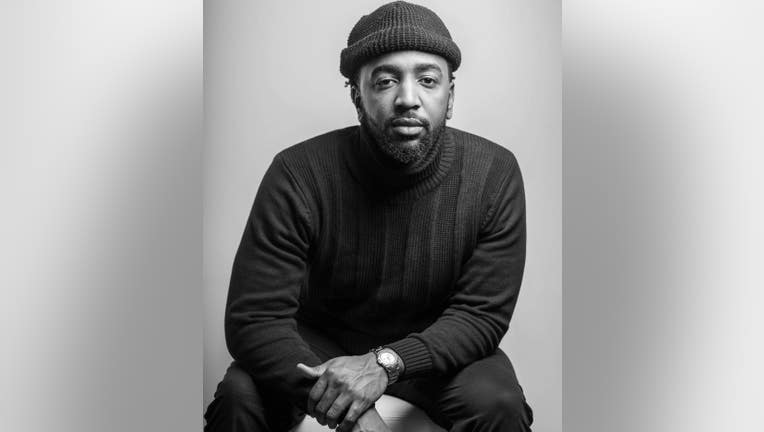
At 25, Oakland native Akintunde Ahmad is a filmmaker, journalist, has taught Oakland kids and has now launched a clothing line ethically sourcing textiles from Ghana. (Credit: Eno Inyangete )
OAKLAND, Calif. - At age 25, few would argue Oakland native Akintunde Ahmad has accomplished more than most.
The product of the Oakland Unified School District completed his undergrad at Yale University and earned his master’s degree from Columbia Journalism School.
He’s a writer, a journalist, a documentary filmmaker, a podcast co-host, he’s been a teacher to young Oakland kids, and now you can add clothing designer and entrepreneur to the list.
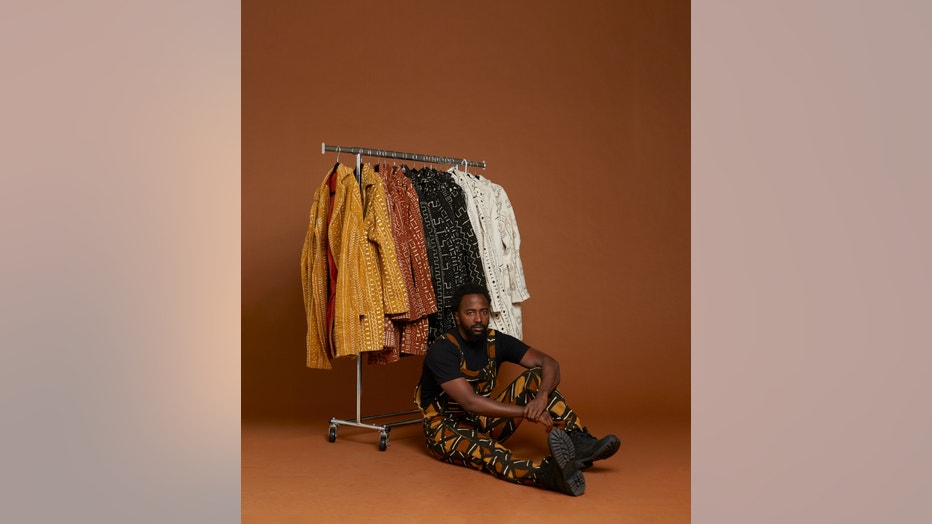
Akintunde Ahmad is behind the new clothing line Ade Dehye, a company that sells ethically sustainable clothing made in Ghana. (Credit: Darrin Baldridge)
KTVU featured Ahmad, known to many as Tunde, in a story after his graduation from Yale in 2018, as he paid tribute to his hometown and expressed gratitude to all those who helped him along the way.
And since then, through all of his varied experiences, he’s continued to bring it back to Oakland, where’s living now.
In a planned move that was hastened by the pandemic, the Oakland Technical High School graduate left the Bay Area in 2014, the area from the East Coast in March 2020. And his roughly six years away has been packed with new endeavors and adventures, as he’s followed his own advice to "do what fulfills you."
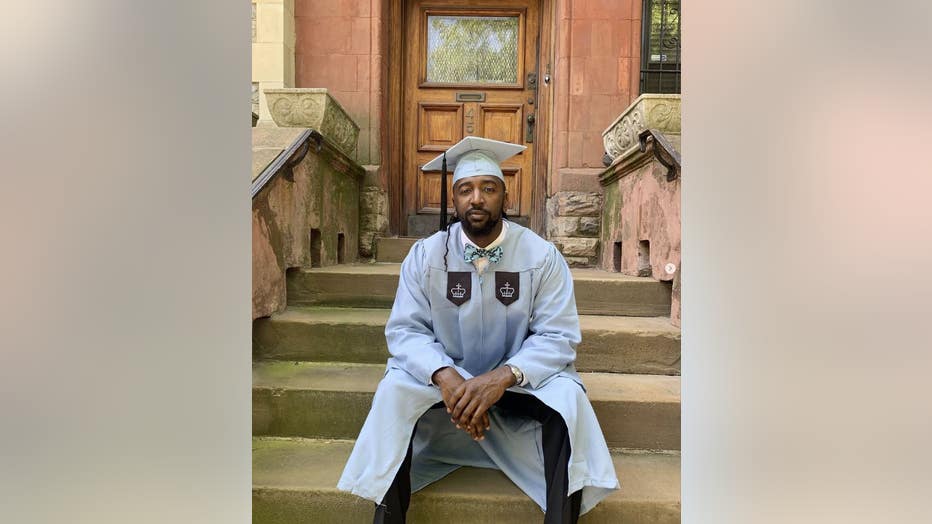
After earning his bachelor's degree at Yale University, Oakland native Akintunde Ahmad went on to graduate from Columbia Journalism School in May 2019.
It was during his junior year at Yale, Ahmad spent time studying abroad in Ghana, where a new passion was born, laying the foundation for his latest endeavor as fashion designer.
"One of the things I got interested in when I was out there was actually the fashion scene and the fashion production," he shared with KTVU. "Anybody who's ever been to any west African country can probably tell you that there is a high concentration of people who are tailors, and you can custom-make any clothes that you want."
He also noted the kind of patterns and fabrics he came upon in Ghana were familiar to him. He grew up in a household where his parents were strong supporters of the pan-African movement, and his mother, who’s also the principal at Oakland’s Piedmont Avenue Elementary School, has been known for her distinctive and eye-catching West African influenced style.
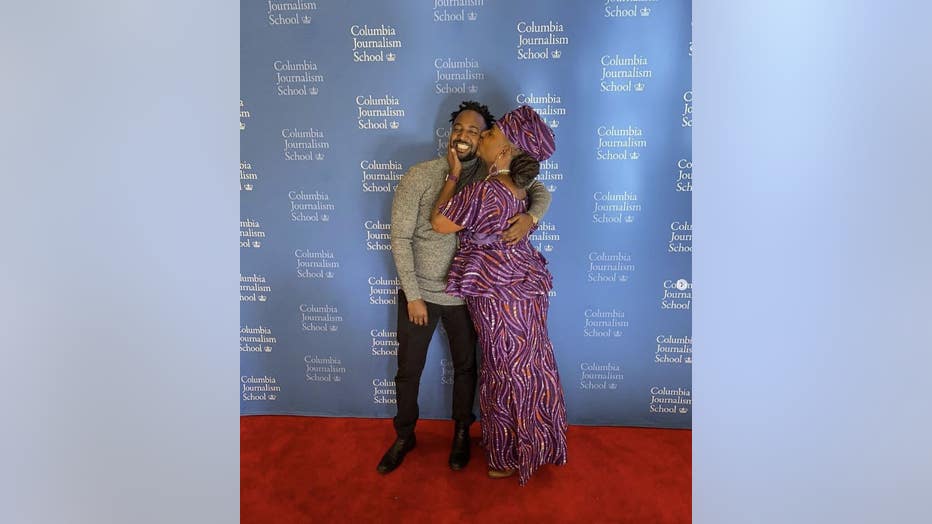
Akintunde Ahmad with his mother, Zarina Ahmad, in December 2019 at the screening of his first documentary film, "Hear Us Out"! (Akintunde Ahmad)
"Anybody who knows my mom and has ever seen her, knows that she’s always dressing in very extravagant west African clothes," Ahmad said, adding, "From a young age just seeing the different kinds of west African textiles, whether it be kente, whether it be mud cloth, or ankara, it was just kind of something that I was used to seeing."
So in Ghana, he enjoyed having access to the vast and rich variety of textiles the country offered. And it became somewhat of a hobby to venture out to fabric markets, hand-pick his own material, design his own clothing and get them custom-made. From boots to shirts and pants, he enjoyed creating his own pieces to wear as part of his everyday attire.
When he returned to the States, he found that when he wore the clothing he designed, it would draw people’s attention. Many would ask where he got his apparel, and when it was revealed he had designed it himself, the next question would inevitably turn to whether he could create a piece for them. At the time, Ahmad said that designing clothes was something he enjoyed doing for himself but had no interest in going beyond that.
That would later change.
Over time, after countless requests from people interested in his designs, he finally decided to try his hand in the fashion industry, though he was keenly aware of his lack of knowledge and inexperience in that world.
"So I just started by trial and error and reaching out to people who I know specifically in Ghana because that's where I started off doing this." Ahmad said.
It was a friend he’d met at the University of Ghana in Accra, who would offer him the guidance he needed to begin.
The friend, Awurama Mankatah, had just founded her own line of clothing called Threaded Tribes.
"She was the one who really helped me. Basically, ended up getting with the same production team as her and worked from there," Ahmad shared.
So in February 2020 he launched his own line, and he called it Ade Dehye. (Ade, after his middle name, which means royal in Yoruba, one of the principle languages spoken in Nigeria and Dehye which also means royal, but in the language of Twi, which is spoken in Ghana.)
On the company website, it said the brand "draws inspiration from across the African Diaspora," with every piece produced in Ghana and all the textiles sourced out of West Africa.
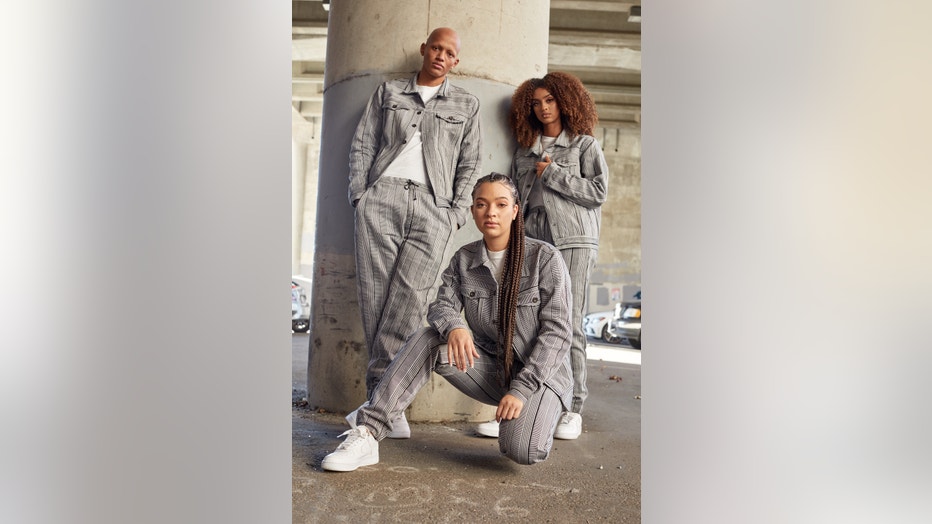
All the fabric from the Ade Dehye clothing line are sourced from West Africa. (Credit: Darrin Baldridge)
"It’s one thing to be Black owned, but it’s another to be 100% Black owned and operated, all the way down to the weaving and dyeing of the fabric and the tailoring of the finished product," the website said.
For Ahmad, the idea behind the clothing line was driven by more than his budding interest in fashion. At the center of his business model was the goal and effort to showcase the beautiful handmade textiles, traditional materials like mudcloth and woven kente, all created in West Africa.
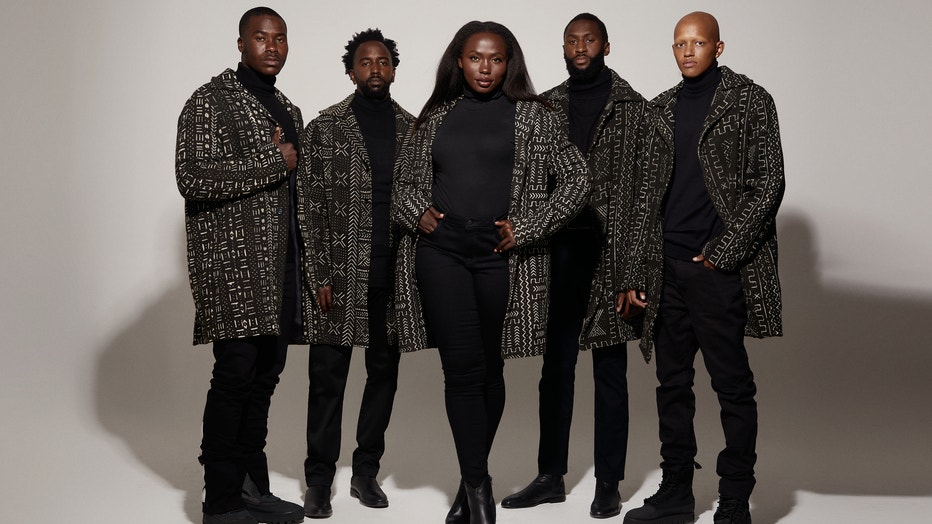
Ade Dehye "draws inspiration from across the African Diaspora" and uses ethically sourced textiles from West Africa. (Credit: Darrin Baldridge)
"I wanted to be at a certain level where folks can then actually see the level of craftsmanship and quality that can be produced on the continent as well. So it’s not just about my brand doing well, it’s about encouraging other people to produce other goods there," Ahmad said.
And in launching his new brand, he was intent on making sure his line would be ethically sourced, benefiting those whose hands created the product.
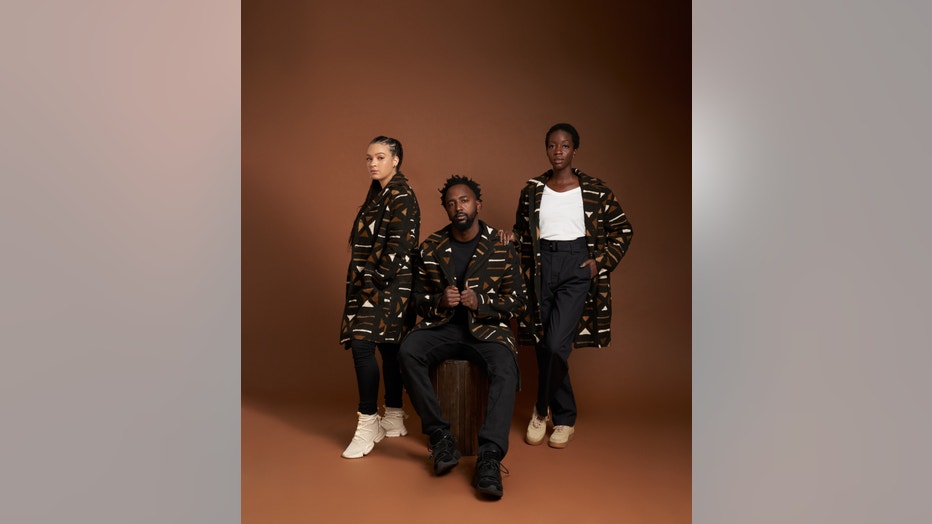
(Credit: Darrin Baldridge)
"This is the landscape that I view everything from," Ahmad said. "There’s how much money my community spends on luxury goods and how little ownership we have of any luxury companies, specifically in the fashion space, and how much we actually create a culture that gravitates towards spending money with these companies. And there’s no pay off for us, besides, yeah waste of money on stuff that doesn't really matter and has no return investment to our community."
There were other goals involved in the inception of Ade Dehye, including creating sustainable, well-made pieces to combat the waste that’s brought on by so-called fast fashion.
It’s a trend, he said, that has led to people purchasing cheaply made, trendy items that end up being worn for a short period of time and then thrown out, only contributing to the climate crisis.
Ahmad said he’s witnessed the massive landfills that line coastal areas of Ghana, which has been a dumping ground for the second hand clothing market.
"60% of the garments that make it there, 60% of those are deemed unusable on arrival and go straight to a landfill," he explained. "There are these giant landfills in Ghana along the coast that act as they’re like coastal border walls, but it’s trash piled super high. A very high percentage of that landfill comes from second hand fashion."
As the sole proprietor, Ahmad has been the one behind every step of the manufacturing process, which has sent him to Ghana three times just last year. He's doing it all, from selecting and buying the fabric, to the logistics of having it shipped, to creating the designs, down to choosing the lining, label, and buttons for his pieces, as well as working the marketing side of the company. And every cent that has gone into the business has been his own. He noted the ongoing shipping crisis has also been a major challenge amid the already high cost of international shipping.
Here at home, he’s held pop-up events in the East Bay where he’s sold the unique hand-woven designs, which can also be purchased online. The cost of his pieces range from $80 and can get up to $300 for apparel that use large amounts of fabric like his trench coats.
"You're paying the people who are spending hours weaving the fabric by hand. So that’s really what goes into the price point," the designer said.
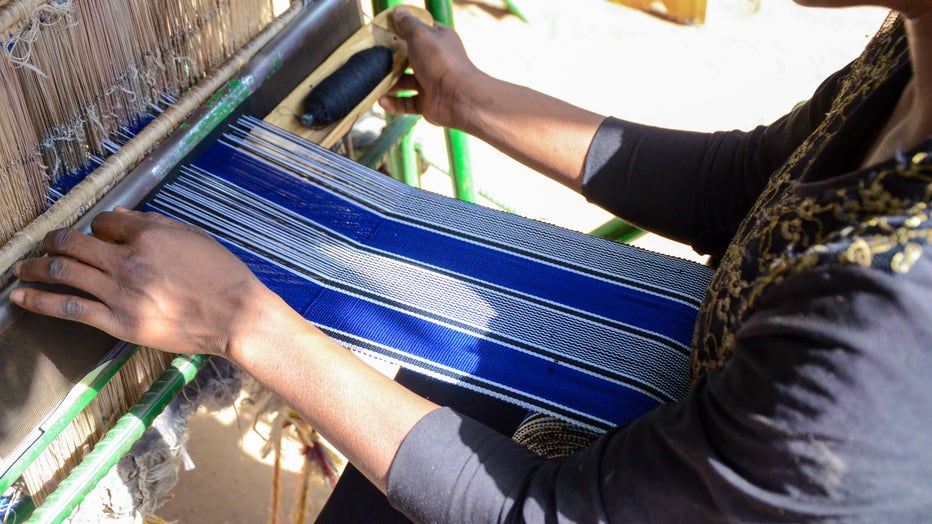
Akintunde Ahmad's Ade Dehye clothing line uses sustainably made, hand-woven textiles from West Africa. (Akintunde Ahmad/Ade Dehye)
And he said his hard work has paid off so far, as he’s been able to turn a profit which he’s then reinvested into Ade Dehye.
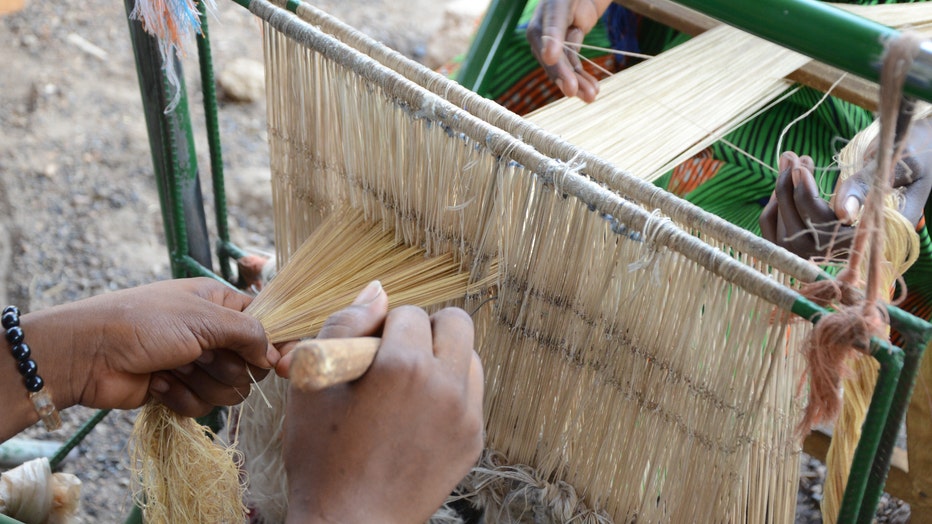
Textiles used in the Ade Dehye clothing line are handmade and ethically sourced from West Africa (Akintunde Ahmad/Ade Dehye)
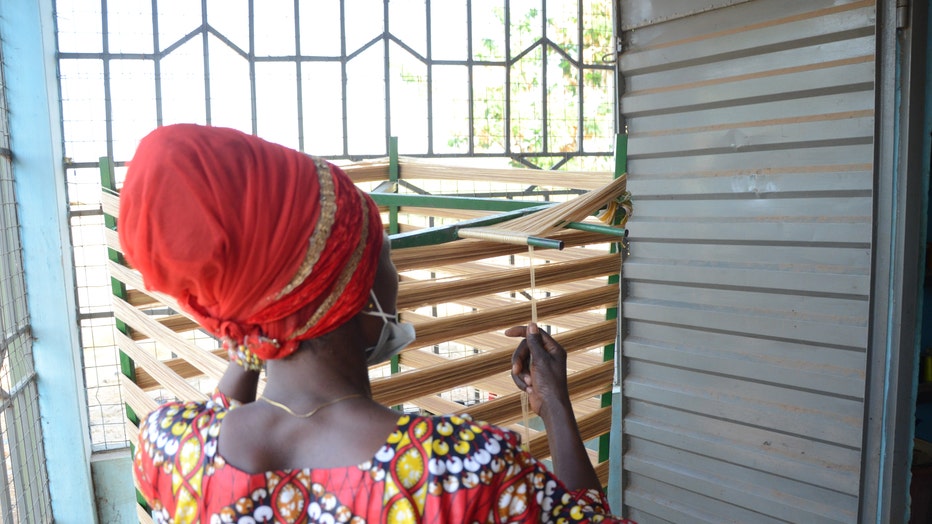
(Akintunde Ahmad/Ade Dehye)
It’s not lost on him that there’s a cheaper, easier way to do this.
"It's definitely much easier to do this in places that have been established industrially for some time and actually specializing in things," Ahmad acknowledged. "In Ghana, a lot of the infrastructure is actively developing or is in early stages of having been developing, so obviously there is a trial and error that comes with this. There are hiccups along the way, but for me, it’s definitely been worth it."
He said his company, not even a year old yet, has been growing at a steady pace that he’s been comfortable with. "You don't want to do what all these other companies and all these countries are doing to the continent of Africa and have done historically, which is come in, exploit, exploit, exploit," Ahmad explained. "It’s fulfilling because again, if I was just in it for the money, I would’ve went another route with it. This is about actually having brand integrity and actually getting in at the ground level and building organically from the start," he added.
The business owner said he’s already seeing how his efforts were making a difference.
"Be the change that you want to see. At the end of the day, I saw an issue of a lack of investment there," the nascent entrepreneur shared. "And even though I'm doing it at such a small individual scale, I can already see the payoff, and I can only imagine what would happen if you know, we get increased investments and actually scale this up in other ways."
Ultimately, his hope was to expand and grow, all while staying true and honest to the business model that started this journey.
"The goal, my dream is to one day… make the brand a household name and perhaps even merge with other designers and stuff who are out there you know, form a company where we’re like, ‘This is where I can get a quality jacket.’ And you know the whole identity is like, ‘This is made in Ghana. This is made in West Africa.’"
And while he’s steadily and carefully working toward that dream, Ahmad has kept busy in a myriad of other projects that have nothing to do with fashion.
He’s been hired as an associate producer for Proximity Media, working alongside Emmy award-winning filmmaker Pete Nicks on an upcoming documentary, set to be released in the coming year.
He’s also shared his voice and views on the podcast "Viewers Like Us."
And shortly after his return to the Bay Area, he had the opportunity to be an instructor as part of the Oakland Unified School District’s African American Male Achievement Program. The district described the program as one "designed to dramatically improve academic and ultimately life outcomes for African American male students in Oakland."
Coincidentally, the former Oakland student got assigned to his mother’s school at Piedmont Avenue Elementary, where he worked with fourth and fifth grade boys.
He said it was an opportunity to give back to the city he loved.
"Oakland is the city that shaped me, that raised me, that gave me my perseverance and resilience and just my outlook and understanding of the world, and so whenever I have the opportunity to pay it forward and have the influence on the next generation, I try and do that."
Over the years, media outlets, including KTVU, have covered Ahmad’s accomplishments. And he acknowledged the responsibilities he carried with the attention he’s received.
"The news coverage when I graduated from high school and of course again when I graduated from Yale, it just put me in the spotlight that you know, I didn't really take lightly. I knew that regardless of my intention, that I’d become a role model for all students in Oakland," he said.
Through his job teaching Oakland boys, he used their shared experiences to connect with them. "Got to make sure they have any type of guidance and type of positive light from someone who can relate to them because they've had the same life, knows what it’s like growing up in Oakland, knows what it’s like going through Oakland public schools," Ahmad said.
And the message he’d hoped to convey to those who came after was one that he’s demonstrated time and time again through all that he’s tackled at the young age of 25.
"Life is long. It’s never too early, too late to try new things," he said, an approach he’s clearly adopted and embraced. "I think that’s how I'm going about life right now, is that I had an interest in journalism, I had an interest in podcasting, in documentary film, I'm just going for it, doing it. I have an interest in clothing -- and you know that value drive proposal behind it -- and I was like, let's see if we can go about doing this."
And this from an Instagram post he shared back in 2019: "Back to back Ivy League Degrees from that Oakland Public School District. Never let anyone tell you what you can or can't do, and if they try to, use it as motivation to prove them wrong."
While he’s out there in the world, investing in Ghana, creating new films, taking on other new projects, while perhaps proving naysayers wrong, he’ll no doubt continue to remind us all where he came from.
"On all fronts it still comes back to Oakland," the native son said, "For me, Oakland is home… Oakland will always be home base."

